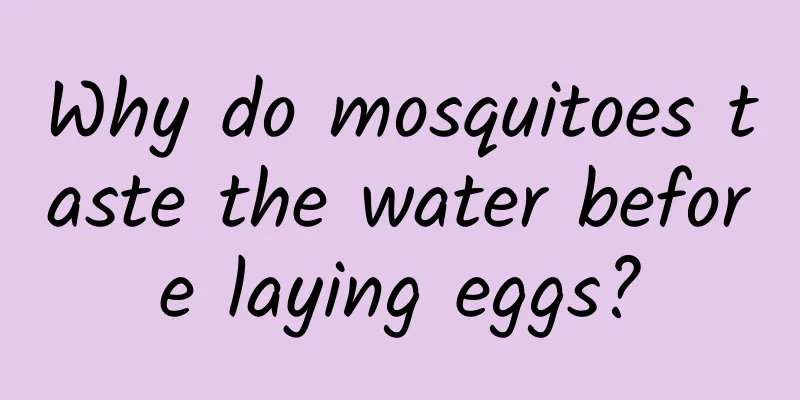Why do mosquitoes taste the water before laying eggs?

|
Speaking of mosquitoes, most people have probably been bitten by them. There is no way, and also for the sake of their children, female mosquitoes can only suck the blood of other creatures in order to obtain the nutrients needed for egg development. In fact, a little less blood is nothing. After all, the amount of donated blood is enough for many mosquitoes to have a good meal. However, the wound will become very itchy after being bitten. This is because the saliva secreted by the mosquito contains anticoagulants and anesthetics. Not only will it itch, but what's more frightening is that mosquitoes may carry mosquito-borne pathogens. For example, Aedes aegypti can spread pathogens such as yellow fever, Zika virus and dengue fever. Therefore, how to eliminate mosquitoes has always been a pressing problem for many biologists. As soon as they heard about killing mosquitoes, everyone took out mosquito repellent tablets and electric mosquito swatters from under their beds... Wait, that’s not the case! These are just small tricks. The correct way to kill mosquitoes is to kill them at the source, that is, to make the mosquito larvae “stillborn”. We know that many insects like to lay their eggs in water, and mosquitoes are no exception. However, they also have requirements for water quality when laying eggs. They generally choose to lay eggs in fresh water with relatively low salinity. But there were a few stupid mosquitoes who, perhaps because they thought they were still young and didn't want children, laid their eggs in salty water. Not surprisingly, these eggs died in the salty water. Some people may wonder why mosquitoes die when they lay their eggs in salt water? How do they distinguish between fresh water and salt water? The reason why mosquito eggs die in salt water is simple: the salt concentration is too high, which destroys the physiological structure of the eggs. In order to clarify the distinction between fresh water and salt water, researchers from Rockefeller University and the Kavli Institute for Neuroscience conducted an experiment using genetic and imaging methods. Let's go back to before the mosquito lays eggs. First, the mosquito will determine the egg-laying location. At this time, the mosquito will extend its legs into the water to "taste" the water, thereby activating the mosquito's sensory neurons. Aedes mosquitoes use their feet to taste water Through experiments, it was found that there is a gene called ppk301 in specific neurons in the mosquito's legs and mouth. This gene can sense the presence of water and help mosquitoes correctly distinguish the salt concentration in the water. When the mosquito's legs touch the water source, the ppk301 gene activates neurons and produces an "egg-laying permission" signal. Aedes mosquitoes lay eggs after finding fresh water If the water contains high concentrations of salt, the ppk301 gene will also activate neurons to send a signal, but this signal will prevent the "egg-laying signal", that is, telling the mosquito "Don't lay eggs! The water is too salty!" These two signals allow mosquitoes to detect water sources while also preventing them from laying eggs in high-salinity water that would be lethal to their offspring. Through further experiments, the researchers caused the ppk301 gene to mutate and found that mosquitoes with the mutated ppk301 gene would not be able to correctly choose to lay eggs in fresh water even if they were lucky enough to reach the water's edge. The ability to sense water and salt is critical to life because all living things must regulate the balance of body fluids and ions in order for their physiological systems to function properly. Very small terrestrial insects like mosquitoes have a small surface area and volume, which means they are susceptible to desiccation and must seek out water to survive. Researchers said that based on the "gene controlling the egg-laying location" of mosquitoes, they can make a drug that interferes with the ppk301 ion channel, which can reduce the birth rate of mosquitoes from the source and achieve fewer births, fewer births, and fewer births! |
<<: On the importance of the elderly: Are they the ones who make humans live longer?
Recommend
12 key words for automotive marketing in 2021
In 2021, where are the high-value customer groups...
96% of mobile malware targets Android: More than 5 billion apps can be attacked
The report said that 96% of mobile malware target...
There are less than 400 of them. Can this group of "weirdos" in Taihang Mountains dominate the world again?
The towering Taihang Mountains stretch for more t...
Why can a mobile phone be located even after it is turned off? How many secrets do you know about these mobile phones?
Checking on someone? Looking for someone due to a...
Hundreds of apps test Intel chips
With excellent workmanship and powerful performanc...
How does Tik Tok make you addicted?
The world of short videos has never been peaceful...
2020 Q3 Beauty Industry Douyin & Xiaohongshu Marketing Report
From July to September 2020, what are the new e-c...
What are the functions of Foshan WeChat Beauty Mini Program? How much does it cost to develop a skin care product mini program?
The most profitable industry nowadays is the &quo...
1 billion views in 100 languages in 31 years, how does content giant TED operate?
TED, a non-profit organization founded in 1984, i...
WeChat's first update in 2021! This feature is definitely worth a try
The Spring Festival is just one month away, and I...
Yuzu Investment Classroom Series Courses (Third Phase + Fourth Phase + Fifth Phase + Sixth Phase + Highlights Edition)
Resource introduction of the Yuzu Investment Clas...
Emergency Science Popularization - Illustration of Earthquake Intensity
Earthquake intensity refers to the degree to whic...
It is a power source and also a wireless media center - BAKE I mobile power experience
Smartphones are becoming more and more like compu...
Zhihu Promotion and Traffic Draining Strategy
Today I will share with you a low-cost, high-retu...


![How to operate Tmall [Billion Club] merchant page?](/upload/images/67cc3a401a856.webp)






